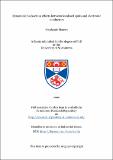Files in this item
Dynamical backaction effects between localised spins and electronic conductors
Item metadata
| dc.contributor.advisor | Braunecker, Bernd | |
| dc.contributor.author | Matern, Stephanie | |
| dc.coverage.spatial | 133 | en_US |
| dc.date.accessioned | 2021-04-02T15:03:59Z | |
| dc.date.available | 2021-04-02T15:03:59Z | |
| dc.date.issued | 2020-12-01 | |
| dc.identifier.uri | https://hdl.handle.net/10023/21763 | |
| dc.description.abstract | In this thesis we present an investigation of the influence of quantum correlations on a quantum system’s dynamical behaviour. Our focus is specifically on the time dependence of quantum spins in an environment of itinerant electrons. This is an archetype for strong correlation physics, whose dynamical onset is the central correlation effect investigated in this work. We derive an analytic result for the time evolution of a single localised quantum spin in weak contact with conduction electrons. This result is obtained from a detailed analysis of the pole structure of the Nakajima-Zwanzig equation for the reduced density matrix in Laplace space. We provide a description of the full time range, from very short times in which a novel result for non-Markovian behaviour is obtained, to long times in which we recover the well-known exponential decay expressions. For the short times we show how the non-Markovian memory effects of the spin’s dynamics arise from the backaction of coherent electronic particle-hole fluctuations. As an application of the fast dynamics we propose a cooling protocol going beyond the paradigm of thermodynamic cycles. The protocol relies on a rapid pump scheme with a repeated reinitialisation of the fast quantum coherent dynamics, with each repetition carrying away a small amount of heat from the electronic environment. This protocol is temperature independent and designed to circumvent a natural bottleneck in standard demagnetisation cooling due to long relaxation times at low temperatures. Finally we extend the dynamics to a pair of localised spins coupled through the same electronic environment, using a self-consistent projection operator framework. In contrast to the conventional RKKY coupling we derive a set of coupled equations including the temporal and spatial correlations. This set becomes finite through a meticulous identification of the electronic fluctuations responsible for the coupled dynamics, allowing for a numerical solution. | en_US |
| dc.description.sponsorship | "This work was supported by the Engineering and Physical Sciences Research Council under grant number EP/L015110/1." -- Funding | en |
| dc.language.iso | en | en_US |
| dc.publisher | University of St Andrews | |
| dc.subject | Dynamical behaviour of condensed matter systems | en_US |
| dc.subject | Non-Markovian dynamics in open quantum systems | en_US |
| dc.title | Dynamical backaction effects between localised spins and electronic conductors | en_US |
| dc.type | Thesis | en_US |
| dc.contributor.sponsor | Engineering and Physical Sciences Research Council (EPSRC) | en_US |
| dc.type.qualificationlevel | Doctoral | en_US |
| dc.type.qualificationname | PhD Doctor of Philosophy | en_US |
| dc.publisher.institution | The University of St Andrews | en_US |
| dc.rights.embargoreason | Embargo period has ended, thesis made available in accordance with University regulations | en |
| dc.identifier.doi | https://doi.org/10.17630/sta/52 | |
| dc.identifier.grantnumber | EP/L015110/1 | en_US |
This item appears in the following Collection(s)
Items in the St Andrews Research Repository are protected by copyright, with all rights reserved, unless otherwise indicated.

